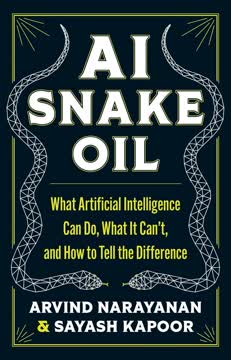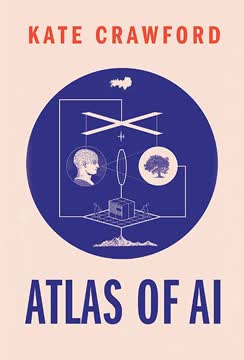Key Takeaways
1. Computers Embody Formal Laws, Not Just Motion
Machines, when they operate properly, are not merely law abiding; they are embodiments of law.
Machines embody law. Beyond their physical motion or power, machines fundamentally represent and execute formal laws or rules. A calculator embodies arithmetic laws; a punch press embodies the law of its operation, blindly applying it regardless of the material. This relentless regularity, not just movement, defines the modern machine.
Information transformation. The evolution of machines, especially electronic ones, has shifted our perception from power transducers to information transformers. Devices like electronic fuel injection systems replace mechanical linkages with information signals. This highlights that the essence of mechanism lies in the embodiment of rules governing information flow, independent of material form.
Abstract vs. embodied. While physical machines must obey natural laws, abstract machine designs (like those in science fiction) are bound only by the rules of the game they define. The crucial property of any game's rules is completeness and consistency, ensuring unambiguous state transitions. This abstract rule-following is the core idea behind computation.
2. The Computer as a Metaphor for a Mechanized World
In an important sense, the computer is used here merely as a vehicle for moving certain ideas that are much more important than computers.
World remade in computer's image. The computer serves as a powerful metaphor to understand how society has increasingly been structured like a machine, even before electronic computers existed. This transformation makes it easier to see the imaginative shift we've worked on the world, viewing processes and even humans in mechanistic terms.
Tools shape perception. Tools and machines are not just practical instruments; they are pedagogical instruments and symbols that enter into our imaginative calculus. From spears changing man's relationship with nature to clocks quantifying time, tools have profoundly altered our understanding of the world and ourselves, acting as agents for change.
Autonomous machines. The clock, as the first significant autonomous machine (modeling planetary motion), shifted time perception from recurring events to abstract, measurable units. This paved the way for a scientific worldview based on mathematically measurable sequences, alienating man from direct experience and preparing the ground for further mechanization of reality.
3. Computers are Universal Machines, But Face Fundamental Limits
Turing answered that question as well: a Turing machine can be built to realize any process that could naturally be called an effective procedure.
Turing's universal machine. Alan Turing proved in 1936 that a single abstract machine (the universal Turing machine) could imitate any other machine describable by an effective procedure. Modern computers are, in principle, universal Turing machines, meaning any computer can imitate any other, and can execute any process that can be formalized as an algorithm.
Limits of computability. However, universality does not mean computers can do anything. There are fundamental, logical limits:
- Undecidable questions: Problems for which no effective procedure exists (e.g., the halting problem).
- Impractical procedures: Problems solvable in principle but requiring infeasible amounts of time or resources.
- Non-formalizable processes: Aspects of human thought or reality that cannot be fully reduced to explicit, unambiguous rules.
Formalization reveals flaws. The requirement to formalize a process for a computer program acts as a merciless critic. It exposes ambiguities, inconsistencies, or gaps in our understanding that might be overlooked in human thought or natural language, highlighting where our understanding is defective or incomplete.
4. Instrumental Reason Equates Rationality with Mere Logicality
Thus have we very nearly come to the point where almost every genuine human dilemma is seen as a mere paradox, as a merely apparent contradiction that could be untangled by judicious applications of cold logic derived from a higher standpoint.
Science as a "poison". While science has brought immense good, its success has led to an overreliance on a narrow definition of rationality, equating it solely with logicality and computability. This "instrumental reason" views the world as a collection of problems to be solved by applying cold logic and technical methods.
Denial of human conflict. This narrow view leads to denying the existence of genuine human dilemmas, conflicts, and incommensurable values. Political confrontations, social rips, and even wars are perceived as mere communication failures or technical problems solvable by information-handling techniques, ignoring the collision of deeply held, often non-logical, human interests.
Truth as provability. Instrumental reason converts truth into mere provability within a formal system. Scientific statements, built on fallible human judgment and intuition, are treated as certain facts, delegitimizing other forms of understanding like art or wisdom. This perspective struggles to account for values, which are themselves based on human judgment.
5. Computer Models Simplify Reality, Reflecting Modeler's Bias
A model is always a simplification, a kind of idealization of what it is intended to model.
Models satisfy theories. A computer model embodies a theory, obeying its laws and allowing consequences to be drawn through simulation. Running a program based on a theory allows us to see the theory "behave," providing a dynamic way to explore its implications, like simulating a falling object's trajectory.
Simplification is inherent. Models necessarily simplify reality by selecting what is deemed "essential" for a particular purpose. This selection is an act of judgment, often influenced by the modeler's implicit mental models, values, and cultural biases. What is left out can be crucial, and the model itself may introduce properties not present in the modeled system.
Performance vs. explanation. A model's successful performance does not automatically validate it as a comprehensive theory or explanation. A complex model might accurately simulate behavior through ad-hoc patches (like the "ether turbulence" example), but lack the underlying structure or general principles needed for true understanding, unlike models based on deep, unifying theories.
6. AI's View of Human Intelligence is Simplistic and Flawed
Few "scientific" concepts have so thoroughly muddled the thinking of both scientists and the general public as that of the "intelligence quotient" or "I.Q."
Intelligence is context-dependent. The notion of a single, measurable "intelligence" (like IQ) is profoundly misleading. Intelligence is meaningful only relative to specific domains of thought and action within a cultural and social context. Comparing intelligences across vastly different domains (e.g., a chess program vs. a mother's judgment) is nonsensical.
AI's narrow focus. Artificial intelligence often operates on a simplistic view that intelligence is reducible to formalizable problem-solving processes (like those in GPS). This ignores the multifaceted nature of human intelligence, which includes intuition, wisdom, creativity, and is deeply intertwined with lived experience and emotional sensibility.
The "information processing system" metaphor. Viewing humans and computers merely as species of the same genus ("information processing system") is an oversimplification. While humans process information, the modes and contexts of this processing, including kinesthetic knowledge and knowledge gained from being treated as human, may be fundamentally different and non-formalizable in computational terms.
7. Human Understanding Transcends Formalizable Information Processing
To know with certainty that a person understood what has been said to him is to perceive his entire belief structure and that is equivalent to sharing his entire life experience.
Understanding requires context and experience. Understanding natural language, or any complex phenomenon, is not merely a matter of syntactic analysis or mapping to formal conceptual structures. It requires a vast, constantly changing belief structure built from an individual's entire life experience, including emotional and cultural contexts.
Limits of formal representation. It is not clear that all human knowledge and understanding, particularly kinesthetic knowledge or knowledge gained from social interaction and emotional experience, can be fully encoded in computer-manipulable information structures. Symbolic representations may lose essential information.
Multiple modes of thought. Neurological evidence suggests the human brain employs distinct modes of thought (e.g., the logical, sequential left hemisphere and the holistic, intuitive right hemisphere) that operate independently and simultaneously. Intuitive thought, potentially operating with different standards of evidence (like metaphor), may access insights not available to purely logical processes, suggesting human thought is not solely reducible to formal computation.
8. Ethical Limits Dictate What Computers Ought Not Do
The very asking of the question, "What does a judge (or a psychiatrist) know that we cannot tell a computer?" is a monstrous obscenity.
Beyond "can" to "ought". The crucial questions about computers are not about their technical capabilities ("can they do X?"), but about the ethical appropriateness of assigning certain tasks to them ("ought they do X?"). Just because a computer could be programmed to make judicial or psychiatric judgments doesn't mean it should.
Alien intelligence. Computer intelligence, however advanced, is fundamentally alien to genuine human problems and concerns. Human problems arise from unique biological, emotional, and social needs, and are embedded in a context of lived experience, values, and cultural norms that computers cannot share or understand in a human way.
Wisdom is non-computable. Tasks requiring wisdom, which involves integrating knowledge, experience, values, and intuition in complex, often non-logical ways, should not be delegated to computers. Since we have no way of making computers wise, assigning them tasks that demand wisdom is irresponsible and potentially harmful.
9. Incomprehensible Programs Lead to Abdication of Responsibility
This means that, though machines are theoretically subject to human criticism, such criticism may be ineffective until long after it is relevant.
Beyond human comprehension. Large, complex computer programs, often built incrementally by teams over time, can quickly surpass the understanding of any single person or even the original developers. This makes their inner workings, the criteria and rules governing their decisions, effectively opaque.
Immunity to change. These incomprehensible systems become resistant to substantial modification. Any significant change risks rendering the entire system inoperative, leading to a reliance on the existing, poorly understood logic. This entrenches the rules embodied in the program, making them immune to challenge or ethical review.
Destruction of history and context. Relying on machine-readable data and computer-generated reports can lead to the destruction or recreation of history, as seen in the Vietnam War example. Data not in a standard format is discarded, and computer outputs gain undue authority, displacing human judgment and historical context.
10. Instrumental Reason Corrupts Language and Devalues Human Concerns
Justice, equality, happiness, tolerance, all the concepts that. . . were in preceding centuries supposed to be inherent in or sanctioned by reason, have lost their intellectual roots.
Language as mere tool. Instrumental reason reduces language to a purely functional tool for manipulating things and events. Concepts are stripped of their rich, non-logical meanings and become mere abbreviations for factual data. This corrupts language, making it difficult or impossible to articulate values, emotions, or subjective experiences.
Loss of objective values. When reason is confined to calculation and classification of facts, concepts like justice, freedom, or dignity lose their rational grounding. They become scientifically unverifiable and meaningless in themselves, leaving no objective basis for asserting that one ideal is better than its opposite.
Mystification and expertise. The jargon-laden language of the technological elite mystifies their work, creating an aura of expertise that excludes lay understanding. This reinforces the idea that only experts can address complex problems, further disempowering individuals and hiding the underlying value choices and conflicts.
11. Reclaiming Human Choice Against Technological Inevitability
Power is nothing if it is not the power to choose.
Technological inevitability is a myth. The notion that certain technological developments are unstoppable and that "there is no turning back" is a dangerous myth. It serves to remove responsibility from individuals and institutions, fostering a sense of impotence in the face of perceived forces beyond control.
Decision vs. choice. While machines and individuals operating under instrumental reason can make decisions based on calculations and predetermined rules, authentic human action involves choice. Choice terminates a chain of reasoning not with "Because you told me to," but with "Because I chose to," asserting autonomy and responsibility.
Reasserting human dignity. Resisting the imperialism of instrumental reason requires reclaiming human dignity, authenticity, and individual autonomy. It means recognizing that rationality includes intuition and feeling, that not all truth is formally provable, and that ethical considerations must guide the application of science and technology, particularly by choosing not to delegate tasks that demand human wisdom and values.
Last updated:
Review Summary
Computer Power and Human Reason explores the ethical implications of artificial intelligence and computing. Weizenbaum argues against blindly applying technology to human problems, emphasizing the importance of human judgment and ethics. The book discusses the limitations of computers, the psychology of programmers, and the dangers of over-relying on machines. Despite being written in the 1970s, many readers find it still relevant today, praising its insights on the relationship between humans and technology. Some criticize its organization and dated technical details, but most appreciate its philosophical depth and prescient warnings about AI.
Similar Books










Download PDF
Download EPUB
.epub digital book format is ideal for reading ebooks on phones, tablets, and e-readers.




